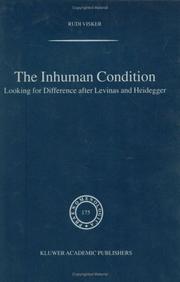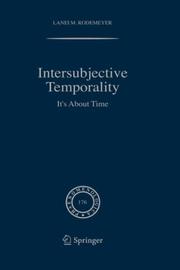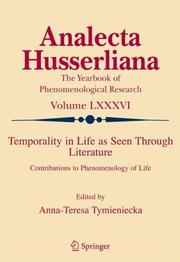| Listing 1 - 10 of 38 | << page >> |
Sort by
|
Book
ISBN: 9780262038539 0262038536 9780262348263 0262348268 Year: 2018 Publisher: Massachusetts The MIT Press
Abstract | Keywords | Export | Availability | Bookmark
 Loading...
Loading...Choose an application
- Reference Manager
- EndNote
- RefWorks (Direct export to RefWorks)
Addressing one of the most repressed subjects in landscape architecture, this book could only have been written by someone who is both an experienced gardener and a landscape architect. With Overgrown, Julian Raxworthy offers a watershed work in the tradition of Ian McHarg, Anne Spirn, Kevin Lynch, and Gyorgy Kepes. As a discipline, landscape architecture has distanced itself from gardening, and landscape architects take pains to distinguish themselves from gardeners or landscapers. Landscape architects tend to imagine gardens from the office, representing plants with drawings or other simulations, whereas gardeners work in the dirt, in real time, planting, pruning, and maintainting. In Overgrown, Raxworthy calls for the integration of landscape architecture and gardening. Each has something to offer the other: Landscape architecture can design beautiful spaces, and gardening can enhance and deepen the beauty of garden environments over time. Growth, says Raxworthy, is the medium of garden development; landscape architects should leave the office and go into the garden in order to know growth in an organic, nonsimulated way.

ISBN: 1402028253 140202827X 9781402028274 1402028261 1280411929 9786610411924 9400789262 9781402028250 9781402028267 Year: 2004 Volume: 175 Publisher: Dordrecht ; London : Kluwer Academic,
Abstract | Keywords | Export | Availability | Bookmark
 Loading...
Loading...Choose an application
- Reference Manager
- EndNote
- RefWorks (Direct export to RefWorks)
At the origin of this volume, a simple question: what to make of that surprisingly monotonous series of statements produced by our societies and our philosophers that all converge in one theme - the importance of difference? To clarify the meaning of the difference at stake here, we have tried to rephrase it in terms of the two major and mutually competing paradigms provided by the history of phenomenology only to find both of them equally unable to accommodate this difference without violence. Neither the ethical nor the ontological approach can account for a subject that insists on playing a part of its own rather than following the script provided for it by either Being or the Good. What appears to be, from a Heideggerian or Levinasian perspective, an unwillingness to open up to what offers to deliver us from the condition of subjectivity is analysed in these pages as a structure in its own right. Far from being the wilful, indifferent and irresponsive being its critics have portrayed it to be, the so-called 'postmodern' subject is essentially finite, not even able to assume the transcendence to which it owes its singularity. This inability is not a lack - it points instead to a certain unthought shared by both Heidegger and Levinas which sets the terms for a discussion no longer our own. Instead of blaming Heidegger for underdeveloping 'being-with', we should rather stress that his account of mineness may be, in the light of contemporary philosophy, what stands most in need of revision. And, instead of hailing Levinas as the critic whose stress on the alterity of the Other corrects Heidegger's existential solipsism, the problems into which Levinas runs in defining that alterity call for a different diagnosis and a corresponding change in the course that phenomenology has taken since. Instead of preoccupying itself with the invisible, we should focus on the structures of visibility that protect us from its terror. The result? An account of difference that is neither ontological nor ethical, but 'mè-ontological', and that can help us understand some of the problems our societies have come to face (racism, sexism, multiculturalism, pluralism). And, in the wake of this, an unexpected defence of what is at stake in postmodernism and in the question it has refused to take lightly: who are we? Finally, an homage to Arendt and Lyotard who, if read through each other's lenses, give an exact articulation to the question with which our age struggles: how to think the 'human condition' once one realizes that there is an 'inhuman' side to it which, instead of being its mere negation, turns out to be that without which it would come to lose its humanity?
Philosophy --- Metaphysics --- filosofie --- existentialisme --- metafysica --- Levinas, Emmanuel --- Heidegger, Martin --- Difference (Philosophy) --- Philosophy. --- Mental philosophy --- Humanities
Book
ISBN: 9789400722101 9789400722118 9400722109 9400722117 Year: 2012 Volume: 201 Publisher: Dordrecht [etc.] Springer
Abstract | Keywords | Export | Availability | Bookmark
 Loading...
Loading...Choose an application
- Reference Manager
- EndNote
- RefWorks (Direct export to RefWorks)
This is the first and only collection of essays honoring the work of Rudolf Bernet, a philosopher of worldwide authority. The essays are centered on three major themes of Bernet's philosophical itinerary: life, seen from a phenomenological point of view, its relation to subjectivity, experiences and consciousness, and both seen as the ground for an original reflection on art, specifically paintings. The contributors are eminent phenomenologists and scholars closely related to Rudolf Bernet, as person and as philosopher: colleagues, friends and collaborators, former students. Taken as a whole, this volume is a testiment to Bernet's philosophical inspiration and influence, and the enduring importance of his own books, articles and classes.
Philosophy --- Philosophical anthropology --- Aesthetics --- aesthetics --- esthetica --- filosofie --- existentialisme --- Aesthetics. --- Phenomenology. --- Philosophy (General). --- Philosophy, Comparative. --- Philosophy. --- Academic collection --- Festschrift - Libri Amicorum

ISBN: 9781402042140 9781402042133 1402042132 1402042140 Year: 2006 Publisher: Dordrecht Springer
Abstract | Keywords | Export | Availability | Bookmark
 Loading...
Loading...Choose an application
- Reference Manager
- EndNote
- RefWorks (Direct export to RefWorks)
(YET ANOTHER INTRODUCTION IN PHENOMENOLOGY) In both his published and unpublished works, Edmund Husserl, the "father of phenomenology, struggles repeatedly with the relation of the individual subject and intersubjectivity. Since his phenomenology is based upon the temporalizing foundations of the subject, though, he is often accused of solipsism, and his efforts at integrating the subject with an intersubjective existence are registered as falling short of their goal. Important philosophers who use phenomenology as their basis, such as Martin Heidegger and Maurice Merleau-Ponty, furthermore, while implicitly criticizing his limitations, assume the existence of intersubjective foundations without 2 taking up the existence and formation of these foundations themselves. This book addresses the above problematic at several levels: First, it is a careful analysis of Husserl's understanding of inner time-consciousness. I take up each aspect of temporalizing consciousness (i. e. , Urimpression, retention, and protention), explaining it in light of Husserl's phenomenology and showing how it functions in the whole of the "living present, i. e. , our active, constituting consciousness. These sections of the book are helpful both to the uninitiated student trying to enter the world of Husserl's "inner ti- consciousness" and to the experienced Husserl scholar who desires a closer look at Husserl's theory of temporalizing consciousness. Second, as my analyses take us to Husserl's recently published manuscripts, I provide an explanation of Husserl's later considerations of temporalizing consciousness, showing how he developed his earliest conceptions.
Philosophy --- Psychology --- psychologie --- filosofie --- existentialisme --- Intersubjectivity. --- Time --- Time perception. --- Husserl, Edmund, - 1859-1938. --- Philosophy. --- Husserl, Edmund --- Intersubjectivity --- Time perception

ISBN: 9781402053313 9781402053306 1402053304 Year: 2007 Volume: 86 Publisher: Dordrecht : Springer,
Abstract | Keywords | Export | Availability | Bookmark
 Loading...
Loading...Choose an application
- Reference Manager
- EndNote
- RefWorks (Direct export to RefWorks)
Temporality pervades the dynamic joint of existence, and the human being as such. As human beings unfold through ontopoiesis, each move of which punctuates the temporality of life, they, whose life experience, deliberation, planning, reflection and dreaming are permeated by temporal motivations and concerns, feel that they are engaged in the spinning of a common thread. Attributing to that involvement universal laws, constant existential validity and power, they absolutise/hypostasise its rule as a cosmic/human factor: time . Yet today technologies are transforming the temporality of our existence by accelerating, intensifying, expanding our partaking in the world of life. Human communal and social involvement is being challenged in its personal significance to the core of our being. What happens to time ? A basic reinvestigation of the nature of temporality is called for. Human creative endeavor - especially literature - may initiate it. Having the human subject - the creator - at its center, literature is essentially engaged in temporality whether that of the mind or of the world of life through the creative process of writing, stage directing, or the reader's and viewer's reception. Out of the cross-motivations that the creative mind filters in its temporal synthesis in touch with all the perspectives of existence, there surges the deepest significance of life in humanity and culture. But, first of all, life comes to light as timing itself in its logos. (Tymieniecka)
Philosophical anthropology --- filosofie --- wijsgerige antropologie --- persoonlijkheidsleer --- existentialisme --- Philosophy --- Time in literature --- Phenomenology and literature --- Life in literature --- Life --- Literature --- Time in literature - Congresses. --- Phenomenology and literature - Congresses. --- Life in literature - Congresses. --- Life - Congresses.
Multi
ISSN: 00791350 22150331 ISBN: 9781402087981 9781402091780 9781402087974 9781402091773 1402087977 140209177X Year: 2009 Volume: 189-190 Publisher: Dordrecht ; London : Springer,
Abstract | Keywords | Export | Availability | Bookmark
 Loading...
Loading...Choose an application
- Reference Manager
- EndNote
- RefWorks (Direct export to RefWorks)
Both volumes of this work have as their central concern to sort out who one is from what one is. In this Book 1, the focus is on transcendental-phenomenological ontology. When we refer to ourselves we refer both non-ascriptively in regard to non-propertied as well as ascriptively in regard to propertied aspects of ourselves. The latter is the richness of our personal being; the former is the essentially elusive central concern of this Book 1: I can be aware of myself and refer to myself without it being necessary to think of any third-personal characteristic; indeed one may be aware of oneself without having to be aware of anything except oneself. This consideration opens the door to basic issues in phenomenological ontology, such as identity, individuation, and substance. In our knowledge and love of Others we find symmetry with the first-person self-knowledge, both in its non-ascriptive forms as well as in its property-ascribing forms. Love properly has for its referent the Other as present through but beyond her properties.Transcendental-phenomenological reflections move us to consider paradoxes of the “transcendental person”. For example, we contend with the unpresentability in the transcendental first-person of our beginning or ending and the undeniable evidence for the beginning and ending of persons in our third-person experience. The basic distinction between oneself as non-sortal and as a person pervaded by properties serves as a hinge for reflecting on “the afterlife”. This transcendental-phenomenological ontology of necessity deals with some themes of the philosophy of religion. If I am asked in the framework of Book 1, “Who are you?” I, in answering, might say “I don’t know who in the world I am.” Nevertheless there is a sense in which I always know what “I” refers to and can never not know, even if I have become, e.g., amnesiac. Yet in Book 2, “Who are you?” has other senses of oneself in mind than the non-sortal “myself”. For example, it might be the pragmatic context, as in a bureaucratic setting; but “Who are you?” or “Who am I?” might be more anguished and be rendered by “What sort of person are you?” or “What sort am I?” Such a question often surfaces in the face of a “limit-situation”, such as one’s death or in the wake of a shameful deed where we are compelled to find our “centers”, what we also will call “Existenz”. “Existenz” here refers to the center of the person. In the face of the limit-situation one is called upon to act unconditionally in the determination of oneself and one’s being in the world.In this Book 2 we discuss chiefly one’s normative personal-moral identity which stands in contrast to the transcendental I where one’s non-sortal unique identity is given from the start. This moral identity requires a unique self-determination and normative self-constitution which may be thought of with the help of the metaphor of “vocation”. We will see that it has especial ties to one’s Existenz as well as to love. This Book 2 claims that the moral-personal ideal sense of who one is is linked to the transcendental who through a notion of entelechy. The person strives to embody the I-ness that one both ineluctably is and which, however, points to who one is not yet and who one ought to be. The final two chapters tell a philosophical-theological likely story of a basic theme of Plotinus: We must learn to honor ourselves because of our honorable kinship and lineage “Yonder”.
filosofie
---
Metaphysics
---
persoonlijkheidsleer
---
metafysica
---
existentialisme
---
godsdienstfilosofie
---
Psychology
---
metaphysics
---
Philosophy
---
Religious studies
---
Existential phenomenology.
---
Transcendentalism.
---
Phénoménologie existentielle
---
Transcendantalisme
---
EPUB-LIV-FT LIVHUMAI SPRINGER-B
---
Theory of knowledge
---
Academic collection
---
#BIBC:boekadm
Book
ISBN: 9789400718470 9789400718487 9400718470 Year: 2012 Volume: 199 Publisher: Paris ; Berlin ; Heidelberg ; ...[et al.] Springer
Abstract | Keywords | Export | Availability | Bookmark
 Loading...
Loading...Choose an application
- Reference Manager
- EndNote
- RefWorks (Direct export to RefWorks)
The present anthology seeks to give an overview of the different approaches to establish a relation between phenomenology and psychoanalysis, primarily from the viewpoint of current phenomenological research. Already during the lifetimes of the two disciplines' founders, Edmund Husserl (1859 - 1938) and Sigmund Freud (1856 - 1939), phenomenological and phenomenologically inspired authors were advancing psychoanalytic theses. For both traditions, the Second World War presented a painful and devastating disruption of their development and mutual exchange. During the postwar period, phenomenologists, especially in France, revisited psychoanalytic topics. Thus, in the so-called second generation of phenomenology there developed an intensive reception of the psychoanalytic tradition, one that finds its expression even today in current hermeneutic, postmodern and poststructuralist conceptions. But also in more recent phenomenological research we find projects concentrated systematically on psychoanalysis and its theses. In this context, the status of psychoanalysis as a science of human experience is discussed anew, now approached on the first person' basis of a phenomenological understanding of subjective experience. In such approaches, phenomena like incorporation, phantasy, emotion and the unconscious are discussed afresh. These topics, important for modern phenomenology as well as for psychoanalysis, are examined in the context of the constitution of the human person as well as of our intersubjective world. The analyses are also interdisciplinary, making use of connections with modern medicine, psychiatry and psychotherapy. The systematic investigations are enriched by historical analysis and research in the internal development of the disciplines involved. The volume presents recent work of internationally recognized researchers - phenomenologically oriented philosophers, psychoanalysts and psychotherapists - who work in the common field of the two disciplines. The editors hope that this selection will encourage further systematic collaboration between phenomenology and psychoanalysis
Philosophy --- Psychology --- Theory of knowledge --- dieptepsychologie --- psychologie --- filosofie --- epistomologie --- Psychoanalysis and philosophy --- Phenomenological psychology --- Psychoanalysis --- Phenomenological psychology. --- Phenomenology. --- Psychoanalysis and philosophy. --- Philosophy. --- Academic collection --- Philosophy and psychoanalysis --- Psychological phenomenology --- Psychology, Phenomenological --- Existential psychology --- Personality --- Phenomenology --- Psychoanalysis - Philosophy
Book
ISBN: 9789400715158 9789400715141 9400715145 Year: 2011 Volume: 205 Publisher: Dordrecht Springer
Abstract | Keywords | Export | Availability | Bookmark
 Loading...
Loading...Choose an application
- Reference Manager
- EndNote
- RefWorks (Direct export to RefWorks)
This volume begins with Schutz's sketch of how Husserl influenced him. It shows how phenomenological theory of the social sciences differs from positivistic approaches, and presents Schutz's theory of relevances--a key feature of his own phenomenology of the social world. It contains exchanges between Schutz and Eric Voegelin, Felix Kaufmann, Aron Gurwitsch, and Talcott Parsons, and presents, for the first time, Schutz's incisive criticisms of T.S. Eliot's theory of culture.
Philosophy --- Social sciences (general) --- psychosociale wetenschappen --- sociologie --- filosofie --- sociale wetenschappen --- existentialisme --- fenomenologie --- methodologieën --- Social sciences --- Phenomenology. --- Sciences sociales --- Phénoménologie --- Philosophy. --- Philosophie --- EPUB-LIV-FT LIVHUMAI SPRINGER-B --- Academic collection

ISBN: 1402021747 1402021755 9781402021756 9781402021749 Year: 2004 Volume: 174 Publisher: Dordrecht Kluwer
Abstract | Keywords | Export | Availability | Bookmark
 Loading...
Loading...Choose an application
- Reference Manager
- EndNote
- RefWorks (Direct export to RefWorks)
In his last work, "Crisis of the European Sciences and Transcendental Phenomenology", Edmund Husserl formulated a radical new approach to phenomenological philosophy. Unlike his previous works, in the "Crisis" Husserl embedded this formulation in an ambitious reflection on the essence and value of the idea of rational thought and culture, a reflection that he considered to be an urgent necessity in light of the political, social, and intellectual crisis of the interwar period. In this book, James Dodd pursues an interpretation of Husserl's text that emphasizes the importance of the problem of the origin of philosophy, as well as advances the thesis that, for Husserl, the "crisis of reason" is not a contingent historical event, but a permanent feature of a life in reason generally.
Philosophy --- filosofie --- existentialisme --- Husserl, Edmund --- Phenomenology. --- Philosophy, Modern. --- Science --- Philosophy. --- Phenomenology --- Science - Philosophy. --- Phénoménologie --- Philosophie moderne --- Sciences --- Philosophie --- Husserl, Edmund, --- EPUB-LIV-FT LIVPHILO SPRINGER-B --- Philosophy, Modern --- Academic collection --- Normal science --- Philosophy of science --- Modern philosophy
Book
ISBN: 9782287724084 9782287724077 2287724079 2287724087 2287724079 9782287724077 Year: 2008 Publisher: Paris Springer Paris
Abstract | Keywords | Export | Availability | Bookmark
 Loading...
Loading...Choose an application
- Reference Manager
- EndNote
- RefWorks (Direct export to RefWorks)
Les médecins et les équipes soignantes perçoivent comme une nouvelle pression la nécessité de transmettre le diagnostic de cancer et de discuter des options thérapeutiques avec un patient qui n'est pas toujours prêt à s y confronter. Bien que l'on puisse saluer le partage de l'information et encourager la transparence, le médecin prend le risque du blocage de dialogue, d'une indifférence, au pire d'un traumatisme. L'idée d'une diminution d'un certain pouvoir médical s'insinue dans le « dispositif » d'annonce qui renvoie la clinique à des apprentissages techniques. Au contraire, certains médecins cherchent à s'inscrire dans un mouvement plus démocratique. Ils constatent que pour le malade, savoir n'est pas choisir, et que dans les cas difficiles, ils restent encore décideurs. Cet ouvrage fait le point sur les changements obtenus par les lois et leurs conséquences sur les pratiques et incite à une réflexion philosophique sur la vérité et les vérités des interlocuteurs de la scène médicale.
Psychology --- History of human medicine --- Oncology. Neoplasms --- medische psychologie --- filosofie --- geneeskunde --- oncologie --- Cancer - Psychological aspects --- Physician and patient --- Cancer - Aspect psychologique --- Relations médecin-patient --- Cancer - Diagnostic - Aspect psychologique --- Éducation des patients --- Neoplasms - psychology --- Physician-Patient Relations --- Truth Disclosure --- Cancer --- Neoplasms
| Listing 1 - 10 of 38 | << page >> |
Sort by
|

 Search
Search Feedback
Feedback About
About Help
Help News
News